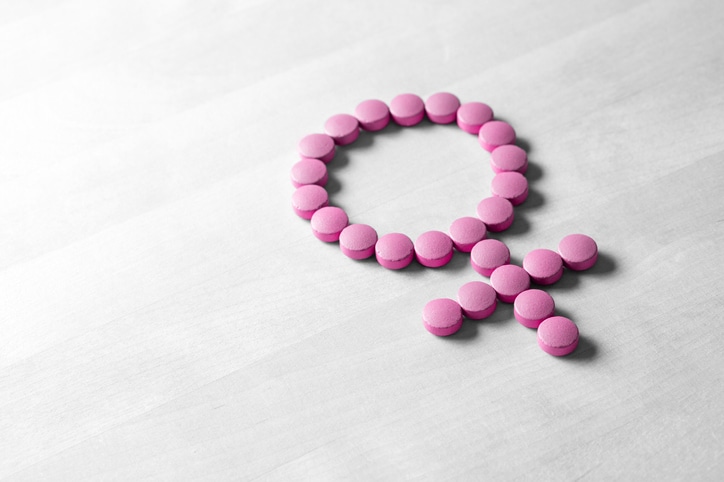Menopause is the time in a woman’s life when her menstrual period has stopped. Menopause is caused by a decrease in the ovaries’ production of the hormones estrogen and progesterone, which eventually results in the ovaries’ ceasing to produce eggs, and the end of menstruation. A woman has reached menopause when she has not had a menstrual period for at least 12 months.

Menopause is a natural process that takes several years. During this time, fertility decreases, and periods often change in duration, frequency, and amount of blood flow. This stage is known as perimenopause, and it is often when symptoms of menopause begin. The average age that menopause occurs is 51, although it may occur prematurely in women who have had total hysterectomies or have received chemotherapy or radiation treatments.
Symptoms And Signs Of Menopause
The symptoms of menopause can vary, with some women experiencing no symptoms at all and others experiencing multiple severe symptoms. The first phase of menopause often begins with irregular periods, and can include the following symptoms:
- Insomnia
- Hot flashes
- Night Sweats
- Fatigue
- Discomfort during intercourse
- Vaginal dryness or itchiness
- Urinary tract infection
- Bladder control issues
- Weight gain
- Thinning hair
- Dry skin
Menopause can also have mental and emotional effects, causing mood swings, depression, and irritability.
How Do You Diagnosis Menopause?
Menopause is usually diagnosed based on symptoms. In some cases, blood tests are used to make an accurate diagnosis and rule out any underlying conditions. Two tests are typically used.

What is premenopause?
The gradual transition between your reproductive years and menopause (the cessation of menstrual periods) is called perimenopause (not premenopause). The literal meaning of this word is “around menopause.” Perimenopause is many years long and can be associated with shorter menstrual periods, irregular menses, night sweats, and other symptoms.
What factors change the timing of menopause?
Menopause occurs, on average, at age 51. The range is from 45 to 55 years old. But certain things can change the natural timing of perimenopause and menopause. These can be:
- Surgery that removes the ovaries — If your ovaries are removed in a full hysterectomy, you will immediately enter menopause. Your periods stop, and you’re likely to have hot flashes and experience the other signs and symptoms of menopause. These can be more severe than normal because your hormonal changes occurred instantly rather than gradually over the course of years.
- Chemotherapy and radiation therapy — These cancer therapies can induce menopause. Chemotherapy usually halts menstruation, but not always permanently. Radiation therapy only affects the function of your ovaries if they are the target of the radiation therapy.
- Primary ovarian insufficiency — About one percent of all women go into menopause before the age of 40. This can result from the failure of your ovaries to produce normal levels of reproductive hormones, which can result from genetic factors or autoimmune disease.
What is a Follicle-Stimulating-Hormone Test?
A follicle-stimulating hormone (FSH) test measures the level of follicle-stimulating hormone in the blood. When a woman’s estrogen levels begin to decrease, the pituitary gland in the brain causes FSH to be released, stimulating estrogen production by the ovaries. If a woman’s levels of FSH are rising, menopause is often the most likely cause.
What is a Thyroid-Stimulating-Hormone Test?
A thyroid-stimulating hormone (TSH) test measures levels of thyroid-stimulating hormone in the blood. It helps to determine whether hypothyroidism is responsible for symptoms; an underactive thyroid can cause symptoms similar to those of menopause.
Vaginal pH testing is also used to help diagnose menopause; pH levels increase to about 6 from the reproductive years’ average of 4.5.
Treatment Of Menopause At Craig Ranch OB/GYN
Treatment for menopause varies depending on the individual. One treatment is hormone-replacement therapy (HRT), in which medication containing estrogen or progesterone is prescribed to replace the hormones that are deficient within the ovaries.

These synthetic forms of hormones are delivered through pills, patches or creams. However, there are risks associated with HRT, including heart disease, stroke, and breast cancer. Risks may vary depending on a woman’s health history and lifestyle. Before deciding if HRT is appropriate, a woman should discuss its risks and benefits with her doctor.
What are the treatment therapies to help with menopause?
There isn’t any medical treatment required for menopause — it is simply your body going through a transition. But that doesn’t mean it’s a piece of cake. The treatments we provide for our menopause patients at Craig Ranch are focused on relieving your signs and symptoms and preventing or managing chronic conditions that may occur with aging and menopause. These are treatments we may use:
- Hormone therapy — Estrogen therapy is the most effective treatment for relieving the hot flashes common with menopause. We typically look to use the lowest dosage of estrogen for the shortest time frame to provide relief. This will depend on your personal and family history. If you still have your uterus, you’ll also receive progestin with estrogen. There is a risk of cardiovascular problems and possible development of breast cancer but starting hormone therapy around the time of menopause has shown to be beneficial for many women. A side benefit of estrogen treatments is that it also helps prevent the bone loss common with osteoporosis and menopause.
- Vaginal estrogen — Vaginal dryness is a common problem for menopausal women. To relieve this, and to help with some urinary symptoms, vaginal estrogen may be prescribed. This is applied as a cream, tablet, or ring.
- Low-dose antidepressants — Some women can’t take estrogen for health reasons and a possible alternative is to prescribe a low-dose antidepressant in the class of drugs called serotonin reuptake inhibitors. These have proven to be effective for managing hot flashes.
- Gabapentin — This seizure drug (brand names Gralise, Horizant, and Neurontin) has also been shown to help reduce hot flashes. As with anti-depressants, this can be a good approach for women who cannot have hormone therapy.
- Clonidine — This blood pressure management drug also can relieve hot flashes.
- Medications to prevent or treat osteoporosis — Although women start losing bone mass in their 30s, the process speeds up after menopause. There are several options for helping reduce bone loss, including vitamin D supplements.
Antidepressants And Menopause
Women suffering from depression or mood changes due to menopause may benefit from taking antidepressants or anti-anxiety medications. Low-dose vaginal estrogen, which is available in a pill or cream form, can be prescribed to help reduce dryness within the vagina.

Medication is also available to treat the osteoporosis often caused by menopause. Women who maintain a healthy and active lifestyle may experience less discomfort during menopause.
What can I do on my own to help cope with my menopause?
The discomfort and irritation of menopause is temporary. But most women are looking for treatments that lessen their symptoms. These are some strategies you can do on your own to reduce or prevent the effects of some menopause issues:
- Monitor hot flash triggers. For many women, hot flashes can be triggered by hot beverages, caffeine, spicy foods, alcohol, stress, hot weather, even a warm room.
- Decrease vaginal dryness. Try over-the-counter lubricants that are water based or silicone based. Avoid products with glycerin, as this can cause burning or irritation. While you won’t be as interested in sex as your hormones decline, staying sexually active helps with vaginal discomfort as it increases blood flow to the vagina.
- Get your shuteye. Work on getting better sleep. Lighten up on caffeine and alcohol, as they can interrupt sleep in larger amounts. Exercise during the day.
- Practice relaxation strategies. You can find lots of online lists of relaxation exercises and techniques that can help you better cope with your menopause symptoms.
- Eat better. If your diet is less than healthy, try to improve it with a variety of fruits, vegetables, and whole grains. Limit the fat, sugar, and oils.
- Stop smoking. In addition to its other impacts on your health, cigarette smoking possibly increases hot flashes and can initiate early menopause.
- Exercise. Regular exercise helps your mood as well as your body. It also helps to fight the effects of aging that are accelerating with menopause and postmenopause.
What Are Some Of The Complications Of Menopause?
In addition to temporary discomfort and symptoms, menopause can cause long-term health complications for women. The bone disease osteoporosis is a common concern for women who have been through menopause. During menopause, production of estrogen, which supports bone mass, decreases. The drop in estrogen causes bones to become less dense, and prone to fracture and injury. Additional complications of menopause may include the following:
- Cardiovascular disease
- Urinary incontinence
- Sexual dysfunction
Women experiencing menopause should consult with their physicians for effective treatment of symptoms, and recommendations for reducing the chances of complications.
Will my menopause ever go away?
Menopause is a normal transition in the female body. As you enter your 40s, your body will likely produce less and less estrogen until you no longer menstruate. Once you stop menstruating and don’t have any periods for 12 months, you are in menopause.

There will be three stages: perimenopause, menopause, and postmenopause. Once in menopause (no periods for one year) and on into postmenopause, you may have some symptoms continue. These can last, on average, for four to five years, but they decrease in frequency and intensity. Of course, there are exceptions and symptoms can last longer, but that’s unusual.
Real Patient Experiences
"I absolutely love Doctor Robert! She has been wonderful helping me through a very challenging perimenopause. Thank you for all the helpful staff."
Schedule A Consultation
To schedule your consultation at our McKinney, TX office, call 214.544.6600. The providers at Craig Ranch OB/GYN are proud to serve patients in McKinney and surrounding areas of Texas.

